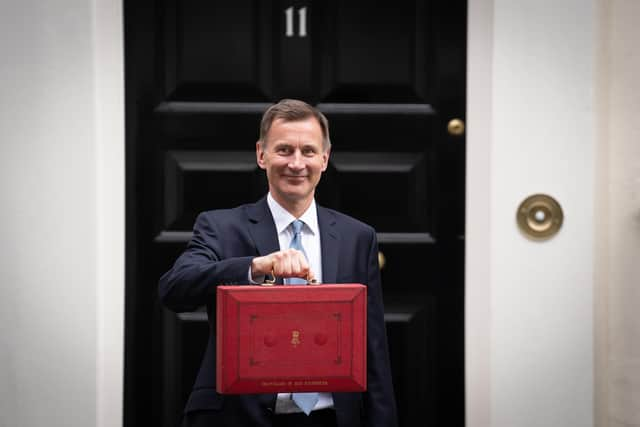Low-paid workers see wage boost ahead of Chancellor's Autumn Statement
Later today Mr Hunt will confirm the rise from £10.42 to £11.44 an hour, the largest cash increase in more than a decade, during his Autumn Statement in the House of Commons.
The move will also see the age that workers will receive the wage drop from 23 years to 21 years, with the Treasury estimating that this will be an increase of almost £2,300 for a 21-year-old full-time worker.
Advertisement
Hide AdAdvertisement
Hide AdThis comes alongside a rise in the National Minimum Wage rates for 18-20 year olds who will see their pay rise by £1.11 to £8.60 per hour.


“The National Living Wage has helped halve the number of people on low pay since 2010, making sure work always pays,” said Mr Hunt yesterday ahead of his speech in Parliament.
Mr Hunt is expected to unveil tax cuts alongside measures to boost business investment and a tougher approach to welfare claimants such as the sick and disabled.
Laura Trott, the Chancellor’s deputy in the Treasury, yesterday said that the drop in inflation meant that the UK has “turned a corner” meaning that ministers can start delivering on tax and spending commitments that have been lacking since Liz Truss’ mini budget last year.
Advertisement
Hide AdAdvertisement
Hide AdOfficial figures published on the eve of the Chancellor’s statement show that although Government borrowing in October was higher than expected, the year-to-date figure is still below the amount the budget watchdog had forecast.
Ms Trott, the Chief Secretary to the Treasury, defended the plans to get people off welfare and into jobs, saying it is the “duty” of those who can work to do so.
The plans could see those with mental health or mobility problems told to search for work which is possible to do from home.
According to The Times, people could see their benefits reduced by £4,680 a year from 2025 as part of a significant tightening of welfare rules.
Advertisement
Hide AdAdvertisement
Hide AdRishi Sunak met his self-imposed target of halving inflation in 2023, with the October figure showing the Consumer Prices Index at 4.6 per cent, although that is still more than twice the Bank of England’s goal of 2%.
Bank governor Andrew Bailey has warned it is “much too early” to say inflation has been beaten.
New polling by Opinium on behalf of the Stop the Squeeze campaign group found that voters do not agree that the economy has “turned a corner” as suggested by ministers.
Only 1 in 6 (16 per cent) said that they expect their finances to improve over the next six months.
Advertisement
Hide AdAdvertisement
Hide AdThe research found that 38 per cent of people worried their finances will worsen this winter, more than twice the number who believe they will be better off.
Speaking ahead of the Autumn Statement, Rachel Reeves, Labour’s shadow chancellor, said: “
Rachel Reeves, Labour’s Shadow Chancellor, speaking ahead of the Autumn Statement said: “After thirteen years of economic failure under the Conservatives, working people are worse off. Prices are still rising in the shops, energy bills are up and mortgage payments are higher after the Conservatives crashed the economy.
“Under Keir Starmer’s leadership, the Labour Party has changed. Labour is now the party of fiscal responsibility, we are the party of business and we are the only party with a plan to make working people better off.”